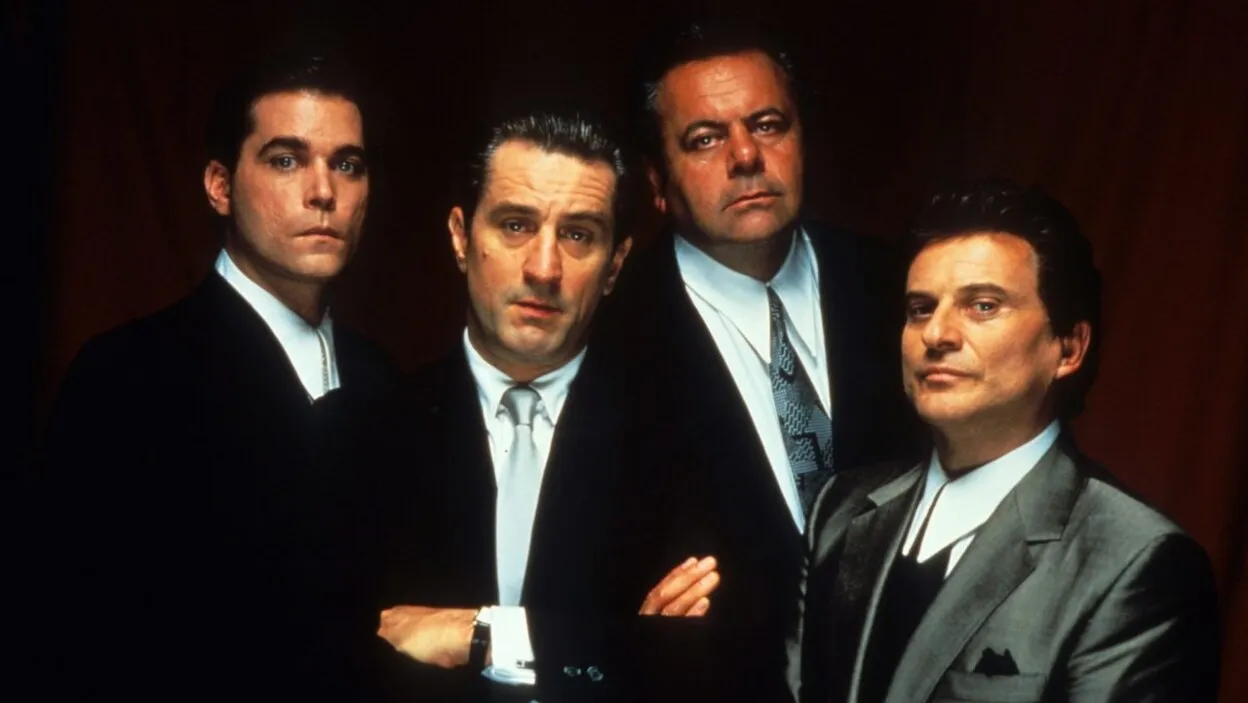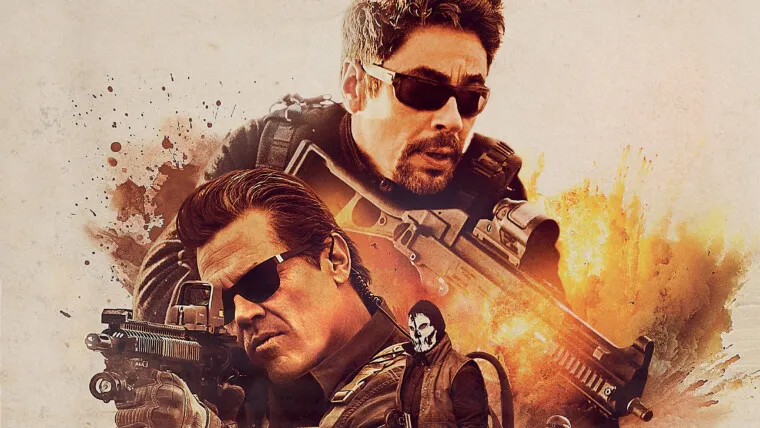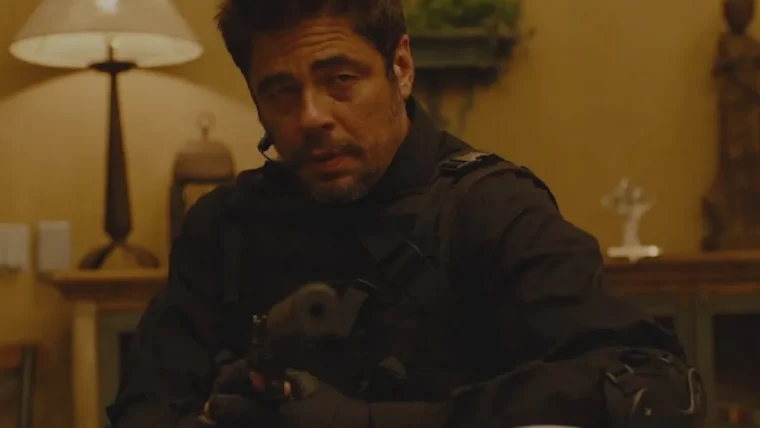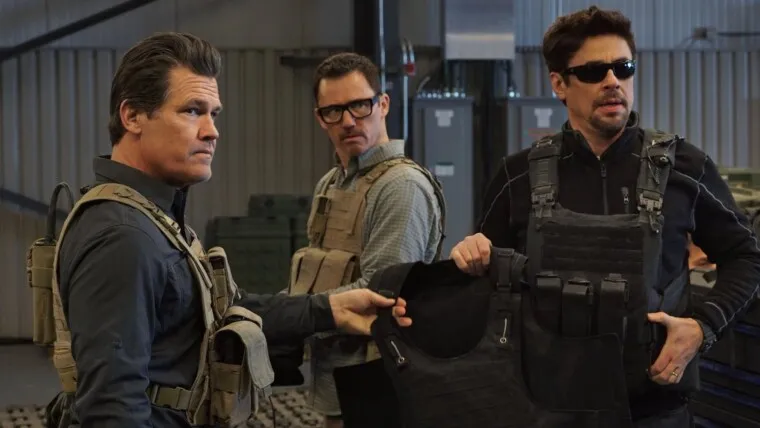Cops and robbers. Besieged banks and punishing prisons. Killer madmen and cold as ice mafiosos. Those are just some of the staples of the cinematic crime genre. And with sequels and reboots of crime classics popping up throughout the month, it’s time to celebrate the films make the bad just look so damn good, and the ones that remind us all that it’s good to be bad. Much like any genre, crime films can often seem so vast and intimidating for anyone looking to jump into it. The uninitiated may find themselves struggling to exactly pinpoint what differentiates a film with criminal elements in it from a genuine crime film. Frankly, I can’t blame them due to the fact that they are just so many facets and aspects of the genre, and it gets even more confusing when you dive into subgenres with crime comedies, psychological thrillers and action-packed procedurals all thrown into the mix.
Fear not, however, on this list we’re not only going to be tackling the various subgenres and elements of crime films but also filling you on which ones are the very the best of the categories they inhabit.
These are ten films that any fan of the cinematic crime genre needs to watch!
10.The Badge- End Of Watch (2012)
Let’s start with something that is as diametrically opposed to the idea of crime as it is inextricably bound to it, law enforcement. There’s nothing quite as archetypal of the portrayal of law enforcement in films quite like the boys and girls in blue, cops. There are many fine candidates for this pick from Ayer’s competently executed, action packed SWAT to Fuqua’s gritty picture of intercity law and order in Training Day but for my pick, I had to go with another one of Ayer’s films, End of Watch. The film takes a unique approach of weaving the handheld camerawork (mostly from Gyllenhaal’s character and his camera), surveillance footage, homemade films and various other in world devices to create a sense of realism. Here Ayer focuses more on the daily grind of the LADP in lieu of more constructed and traditional plots which lends an air of authenticity to the entire affair.
Sometimes we’ll see Gyllenhaal’s Brian Taylor and Michael Pena’s Mike Zavala respond to a domestic violence issue, other times we’ll see them slogging through paperwork. But most of the time, we’ll be hearing the both of them cracking wise on the job and just trying to make the most out of it. Most of the time, in reality, cops aren’t really swept up in massive conspiracies and corruption scandals, they’re just folks trying to do right by the badge. It certainly helps that Gyllenhaal and Pena have great chemistry when they’re on screen, their friendship was not only believable but also quite an enjoyable part of the film. Admittedly, it does at times lean more into the lighter side of law enforcement but it never wears out its goodwill with cheap thrills or over-the-top camp. It manages to strike a great balance between the very human stories of the men on watch and the more grounded reality and danger of their duty. For its ability to be unabashedly human and unwaveringly dedicated in its depiction of the life of everyday cops, End of Watch is a modern day paragon of the police procedural.
9.The Plan- The Usual Suspects (1995)
On the other end of the spectrum, we have entire films dedicated to the process of the crime itself, the plan so to speak. The big score or masterstroke of an ingenious scheme that sets the bandits for life. It’s the elaborate and intricate heist of Ocean’s 11 or the terrifying, time sensitive bank robberies of Heat. Rest assured, bait-and switches, decoys, disguises and good ole fashion slide of hand is all on the table with films like these. In spite of furious protests and persistent lobbying for the brilliant Ocean’s 13, I have to go with my heart and instead recommend The Usual Suspects. What truly sets The Usual Suspects apart is the way film uses the power of the performance and the unreliable narrator as a means of manipulation. The greatest decoy of the film is the myth of a legendary Turkish crime boss known as Keyser Soze, whom the FBI is trying so desperately to track down.
So when five criminals (played by Stephen Baldwin, Gabriel Byrne, Benicio Del Toro, Kevin Pollack and Kevin Spacey), apprehended after committing a heist, each have stories that could shed light on the identity of Soze, the police must unravel a web of lies and deceit to figure out who the mastermind truly is. Without giving too much away, the real “trick” so to speak is the way each of the criminals spins their own version of the story to clear their name. And like Agent Kujan, we too are trying to put the pieces of the puzzle together. Trying to find the smoking gun that will bust this case wide open. And just as the audience and Kujan think they have it all figured out, the film throws them an insane curveball that renders a lot of our evidence moot. The identity of Soze was staring at our faces the whole time and the film much like Soze himself was playing with expectations and emotions all along to keep us in the dark. Masterfully machiavellian in its plot with memorable performances all around, The Usual Suspect manages to make the line-up on this list.
8. The Criminal- Bronson (2009)
Then, there are the criminals themselves and how they can make or break a film. The most engaging ones are cut from a more theatrical cloth. They often function on a level of narcissism far beyond the common man or with an inflated ego or sense of self-importance to match their intelligence and abilities. For them, being caught is half the fun because now they have a captive audience to feed their sense of grandiosity. Think Hannibal Lecter from Silence of the Lambs or John Doe from Se7en. All great choices, don’t get me wrong but if I had to make a choice, it would have to go with Tom Hardy’s outstanding performance in Bronson. To put the plot simply the story revolves around a real-life violent psychotic prisoner named Michael Peterson, before he changed his name to resemble actor Charles Bronson. A man who can’t seem to keep out of the limelight or out prison because he wants to be the UK’s most infamous prisoner.
The film makes no pretension on what drives Bronson to do the hilariously, horrid things he does. There’s no childhood trauma or nuanced backstory here, the man just really wants attention. The film understanding this simplicity plays up to its character’s motivation with scenes in which Bronson is seen on stage in front of a live audience narrating his life. For him, it’s all one big show and he’s the star! Tom Hardy’s performance here is absolutely transformative, losing himself entirely into the role. His commitment to emulate Bronson’s manic ferocity and downright ridiculous tendencies is a testament to his calibre as a thespian. Any actor can mouth sinister monologues from a prison cell, but it takes a special kind to willingly get butt naked and slather yourself in butter all in the name of art. Yes, that actually happened. The prisoner Charles Bronson himself applauded Hardy’s performance, even going so far to call him “Britain’s No. 1 actor”. Bronson is a surprisingly intelligent deconstruction of the narcissistic psyche of criminals, peeling away the layers to reveal something raw, repugnant and altogether amazing.
7. The Case- Zodiac (2007)
Moving away from disturbing characters or specific personalities, there are times the mystery or hunt itself is just as compelling the perpetrator of the crime. Perhaps it isn’t the gore or the crazed look in the killer’s eyes that keeps us up at night but rather the feeling of uncertainty. It’s a fog of dread that hangs over the film that muddies our judgment and keeps us engaged. Honorable mentions go to Nolan’s classic mindf**k Memento and Fincher’s film adaptation of Stieg Larson’s The Girl with the Dragon Tattoo. For this list, it’s Fincher’s Zodiac that makes the cut. During the late 60’s and 70’s, the city of San Francisco lived through the coming and going of the Zodiac serial killer. During that period, the killer would release coded messages and cyphers to the local authorities almost as a sort of game or challenge to them to catch the killer. The film mostly follows the perspective of cartoonist Robert Graysmith, played by Jake Gyllenhaal, who put everything on the line just to find out who exactly the Zodiac killer is.
Eerie and atmospheric, Zodiac at the heart of it all is a film about obsession and fear. Beyond lives of the victims and their families, the killer has touched, it is the entire community as well. It’s the fear of the unknown that Graysmith, along with everyone else, tries to so hard to illuminate. One scene that encapsulates this paranoia so perfectly is when Graysmith suspects one of his interviewees to be the killer himself and is invited to go down to the basement with him. Right at the border of the basement, Graysmith must decide whether he’s willing to risk his life just to put this case to rest. We the audience are right there with him, some screaming for him to get the heck out of dodge and others imploring him to go through with albeit with chattering teeth. Even when the case is “solved” at the end and killer is supposedly caught, nobody is entirely certain of the full picture. There’s always the possibility that we’re missing a piece and the terrifying prospect of that piece being the whole truth.
6.The Double Cross- Sicario (2015)
While on the subject of ambiguity and uncertainty, an equally frightening prospect could be the idea that the very people who we trust the most could be the ones betray us. Oh yes, we’re talking about the double cross and the films that do it o’so well. Crowd favourites include Tarantino’s Reservoir Dogs and Scorsese’s The Departed. Maybe if you’re a bit of a hipster, you’d go for LA Confidential. I’m a little bit more inclined to name Villeneuve’s Sicario. Centring around the American war on drugs, straight-laced FBI agent Kate Macer played by Emily Blunt is called on board a joint-agency operation to take down a powerful drug cartel by Josh Brolin’s shadowy CIA Special Divisions officer Matt Graver. The only problem is she’s not entirely sure if everything they’re doing is legal. Less comforting is the fact that Graver and his task force has employed the help of an assassin, or Sicario, Alejandro Gillick to ensure their mission is a success. Lines will be crossed and faith will be shaken.
In the film, Macer isn’t contending with a bunch of dirty cops or the corruption of an entire division. She’s contending with an entire system that betrays the very values she has sworn to uphold. Time after time, she will have her morals tested and even find out that her supposed guardian angel is actually a necessary evil that will turn on her at any second, performed wonderfully Benicio Del Toro. What’s lost here is more than just trust, it’s faith in the system of law enforcement. The truly tragic part of her realization of this systemic corruption is when she herself is coerced by agents of it to justify the actions committed in the name of the beliefs she once believed! That is some next level shady right there. I would also be remiss if I failed to mention that the action here is shot phenomenally and the score is a true showstopper. Trust me when I say that by the end of it all, you’ll be dying to take a shower just to get the dirt off you.
5. The Kill- No Country For Old Men (2007)
In the world of crime, death is a constant grim part of reality. Regardless of which side of the law you’re standing on, the reaper comes for all. So in the genre, the Reaper can come in the form of a suave, well-dressed man in a suit like Vincent in Collateral or as the unhinged cabbie Travis Bickle from Taxi Driver. One shadow that looms over the competition, however, is Javier Bardem’s Anton Chigurh from the Coen’s No Country for Old Men. When hunter Llewelyn Moss played by Brolin finds a case of money after a drug deal gone wrong, killer for hire Anton Chigurh is dispatched to retrieve the money from Moss by any means necessary. All the while, an aged sheriff played by Tommy Lee Jones is in pursuit of Moss, trying to find Moss before Chigurh finds him first.
Throughout the film, Chigurh is both the driving force of the plot and of the universe he inhabits. Like bloodstains on a wall or bullet holes in a car, there’s just something so unsettling about Chigurh. Maybe it’s the way he so calmly murders people without ever making so much as a peep? Maybe it’s his nihilistic outlook on life that unnerves our more idealistic sentiments? Or it could be the fact that a pale man with bowl cut hair sporting a bolt gun used to kill cows is just all around creepy? For me, it’s all of the above and more. When Bardem was called in for the role by the Coens, he made it very clear that he wasn’t too fluent in English nor was he fan of violence. Weirdly enough, that was exactly why they hired him. Bardem as Chigurh brings a sort of alien quality to the character. He does not revel in his murderous rampage but neither is he remorseful about his actions. In many ways, he is removed from the act of killing itself. He isn’t a greedy bandit or hitman. He isn’t a troubled soul looking to make it in this world. He is the consequence of moral failure. He is the angel of death that haunts the steps of the guilty, and any poor soul that gets in his way. He is the end.
4. The Life- Pulp Fiction (1994)
Though death is certainly an issue worth contemplating, the other side of the aisle can be far more complicated and prove more interesting as well. Ever wonder what criminals do on the down low when they’re not racking up the death toll or having high-speed chases? I do and there is a whole range of films that pay more emphasis on the life of the criminal in lieu of merely zeroing in on the person or the crime in isolation. The excitingly mundane life of the workaday ne’er does well. From mob boss in Black Mass to getaway driver in Drive, these films offer us a slice-of-life look into the world of crime. Tarantino, not contented to offer a single slice, gives us the whole cake in his award winning crime film Pulp Fiction. Chalked full of interesting characters the likes of a pair of chatty hitmen, lovey dovey diner robbers and gambling boxers, Pulp Fiction is a film that spans multiple genres and nails them all with great gusto.
We have black comedy with Samuel L. Jackson’s Jules and Travolta’s Vincent bungling up a retrieval job when Vincent accidentally shoots a hostage in the head. It turns into a bit of a romantic romp when Vincent has to take the boss’ wife, Mia (played by the ever charming Uma Thurman), out for a night out in the town before it all devolves into a heroin-induced panic attack. And that’s just two of the subplots! The dialogue here is pure dynamite with Tarantino’s sharp and memorable writing. Everyone here has makes an impression on screen, especially Jules Winfield with his very interesting recital of Ezekiel 25:17. The use of a non-linear narrative structure adds another dose of chaos to this already wondrous mess of a film, switching between past, present and future to better flesh out the characters we were first introduced. Tarantino may have made ways with his first full feature length film Reservoir Dogs but he created the latest impact on the face of pop culture with Pulp Fiction. If you haven’t the seen it, I strongly suggest you do it while having cheeseburger and milkshake. Trust me, you’ll get it.
3.The Rise- The Wolf of Wall Street (2013)
The appeal of crime films do not always have to derive from the suspense of danger but can also serve as a form of escapism. It’s living vicariously through those lovable con artists and hustlers we see on screen. It’s the high life of being a wealthy international gunrunner in War Dogs or the perks of being a drug lord in Scarface. It’s the joy of witnessing and celebrating their rise to power or wealth. For that. I’ve got to give to it Scorsese, man. He manages to outdrug, outsex and outmatch his contenders with his hedonistic masterpiece, The Wolf of Wall Street. Based on the true story of Wall Street stockbroker Jordan Belfort, the film chronicles Belfort’s journey from highly motivated junior stockbroker to greedy, money-crazed tycoon. This is Leonardo Dicaprio like you’ve never seen him before. So charismatic the man could buy mansions selling ice to Eskimos. So sleazy the man might as well be covered in Vaseline. Like Hardy with Bronson, DiCaprio gives every single bit of his being into the role, really going for the Oscar here. It certainly helps that he has great supporting casts to back him up, the standouts include Jonah Hill as Belfort’s strangely incestuous partner in crime Donnie Azoff and Margot Robbie as Jordan’s wife, Naomi.
The scale and ambition of this film are insane. It’s all made to excite the senses. The lavish feasts that Belfort and his associates enjoy. The decadent drug-fueled, hooker filled parties that the brokers in Stratton Oakmont that never seem to stop, taking it even to the workplace. At some point in the film, the brokers are literally playing darts using midgets as the missiles they throw! The heights of greed, depravity and luxury that Scorsese has on display here is dizzying. If there ever was a case to be made on why you should cheat, steal or swindle your fellow man, this film would be rolled to you on a golden platter. Even when these con artists are at risk of being shut down by the authorities, they still insist on living large. The Wolf of Wall Street is a vision into a paradise for small-time hustlers, middle-class salarymen and crime film buffs.
2-The Fall- Dog Day Afternoon (1975)
As sure as night comes after a long day, the fall is a tragic staple of the crime genre. It is the inevitable downward spiral that comes with this life criminals have chosen. It’s the botched spousal kidnapping in Fargo or a desperate fight for survival during a house invasion gone wrong in Panic Room. The question here is what is the best crime film about the worst kind of screw up? The answer here would most definitely be a bank holdup gone awry in Sidney Lumet’s crime drama, Dog Day Afternoon. A bank robbery done right is quick, efficient and discreet, leaving no sign of evidence and making away with a big score. Here, however, it is anything but successful. When Sonny, played by Al Pacino, and his accomplices attempt to rob a bank, they find themselves woefully unprepared for the chaos that ensues. One of the robbers Stevie, cracks under pressure and bolts for the door. It turns out that the bank they’re robbing has a little over a thousand dollars in it. And to make matters worse, the bank register that Sonny burns after helping himself to some traveller’s cheques triggers the smoke alarm. Not long, pedestrians, the media and the cops are drawn to the bank.
Swinging between comedy and tragedy, Dog Day Afternoon is an all too relatable film about a man at the end of his rope. Pacino as the desperate and irritable Sonny is likeable enough for the audience to root for while being disgruntled enough to make us consider otherwise. It is soon discovered that Sonny is a homosexual and is really robbing the bank to afford his partner a sex change operation. Throughout the film, the audience, much like the hostages, come to understand if not empathize with Sonny. So when the man finally finds a way out of this ordeal just to have it once again all go wrong, we’re left there clenching our teeth and beating our seats in frustration. For humanizing criminals, giving them honest, heartfelt motivations while keeping us at the edge of our seats, Dog Day Afternoon earns its penultimate place on this list.
1.The Family- Goodfellas (1990)
Finally, we come to the most well known, and arguably most significant, aspect of the crime film genre: organized crime. We are entering the realm of the greats here. These are films that aren’t just highlighting a singular facet of the genre but are complex enough to accommodate multiple angles of it. The plan, the mastermind, the rise, the fall, double cross, all in one stellar crime epic! It’s the semi-legitimate con crew from Casino or the Corleone family from the Godfather series. And while for many the obvious pick would be The Godfather, there’s one film that is unparalleled in its portrayal of the crime family epic and that’s Scorsese’s Goodfellas. Simply put that it is the quintessential crime film.
Meet Ray Liotta’s Henry Hill, an Irish member of the mafia trying to make it big in the local Italian American crime family of Brooklyn, New York. It is fascinating to watch how much of his personal life is so tied to his criminal occupation. One moment gangsters and mob bosses can be acting like absolutely friends and family at weddings, luncheons and dinner parties. The next thing we know, they’re helping each other dispose of corpses, execute traitors and pull off robberies. It is that exact dissonance that makes us all so enamoured with this life of crime.
And while Godfather is certainly a riveting piece of high drama with warring families and mobster politics, Goodfellas offers us a more unique and complex perspective into the world of the Italian Crime Family through the eyes of Henry Hill. He’s an immigrant turned adoptive son to a family of immigrants living in the darker side of the American Dream! You can’t make this stuff up! This is partly due to the fact that the film was inspired by real-life events that the actually Henry Hill lived through. The performances from Robert De Niro and Joe Pesci here are legendary. Whenever Pesci is on screen as the short-fused Tommy DeVito, we’re walking on eggshells just waiting for the man to fly off into a rage about something. Until today, one of the most iconic scenes of suspense in cinematic history is when Tommy sternly and coldly inquires of Tommy about what I meant when he complimented DeVito as funny. At that moment, my sphincter held on for dear life! De Niro as Hill’s mentor Jimmy Conway is one individual you certainly do not want to mess with, especially if you’re a loose end. He will pat you on the back right before he hangs you from a meat hook. Goodfellas is the Epic of Gilgamesh of crime films, enormous in scale, elaborate in its structure, nuanced in its execution and no doubt one of the greatest crime films of all time.
https://www.facebook.com/moviedashboard/videos/163596291164838/







